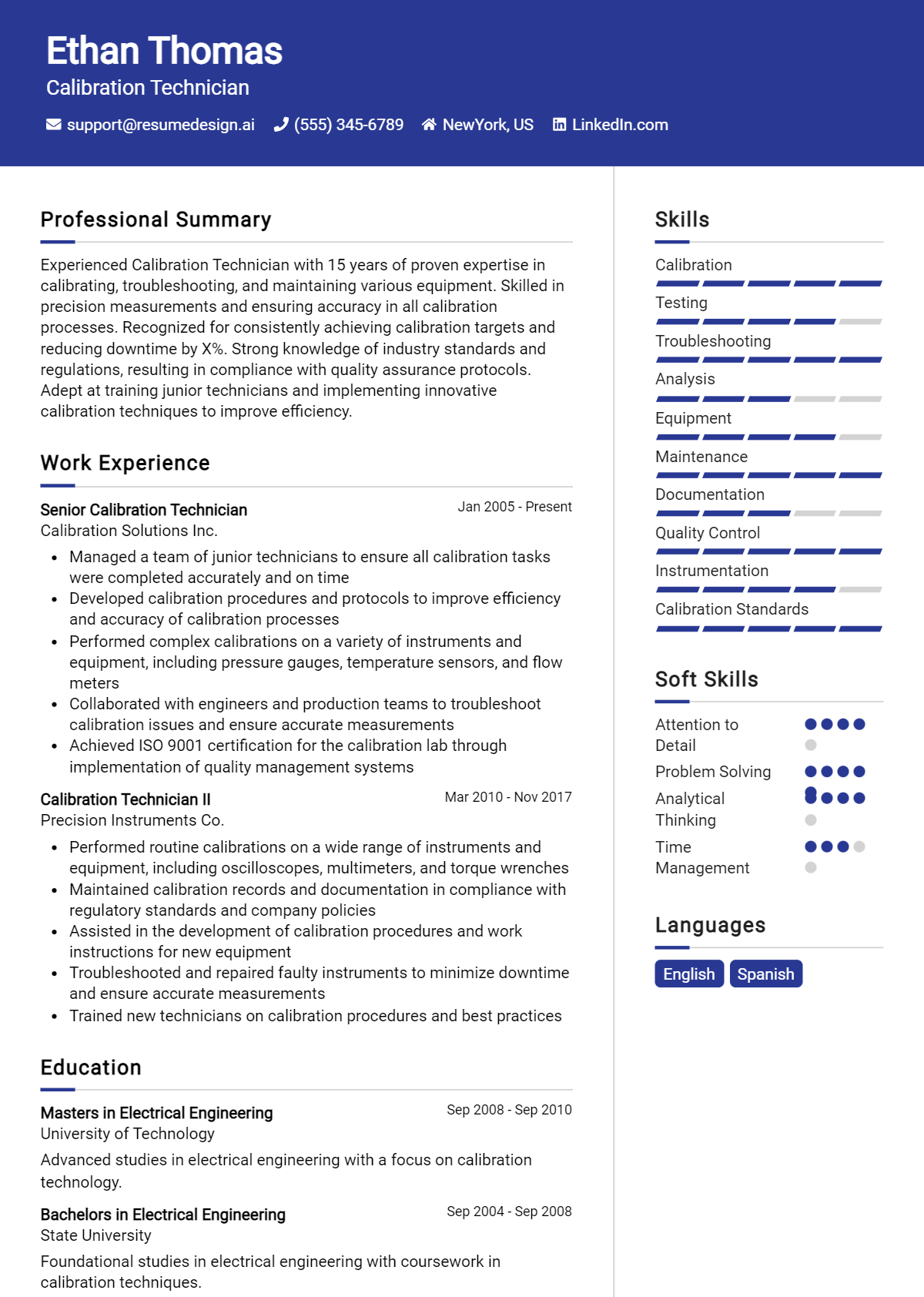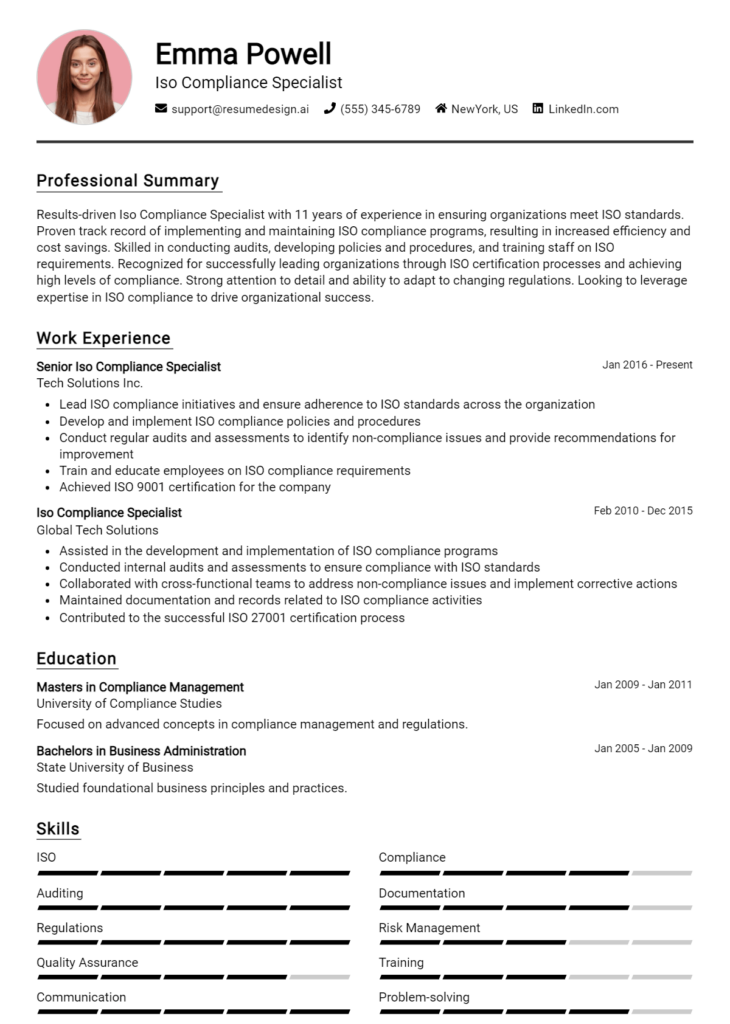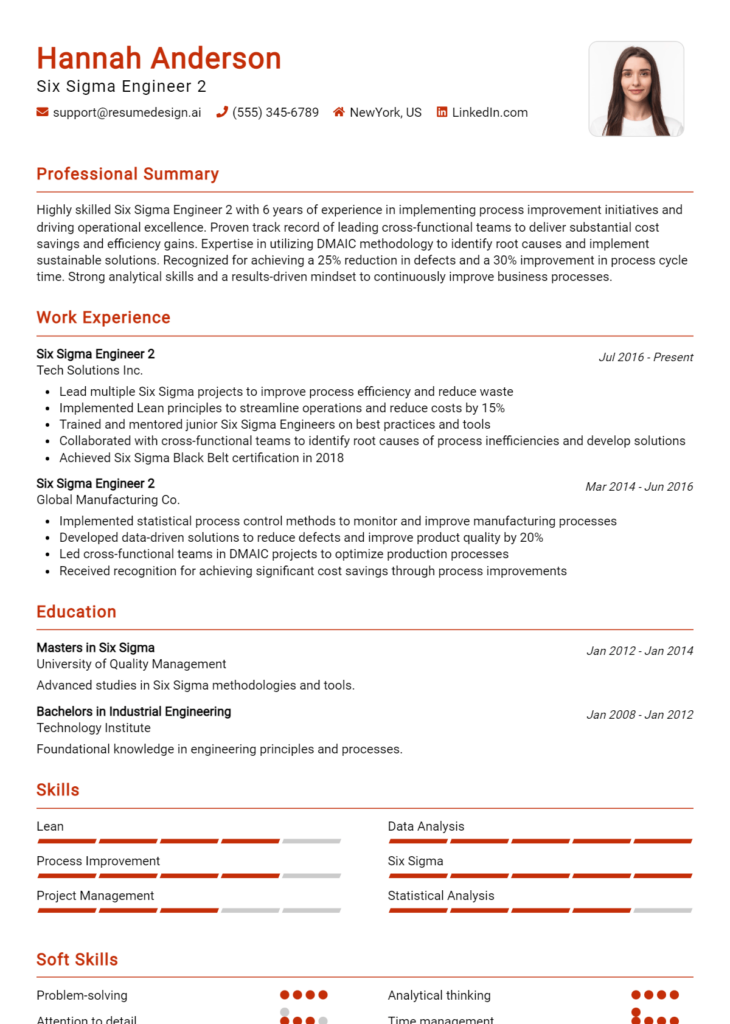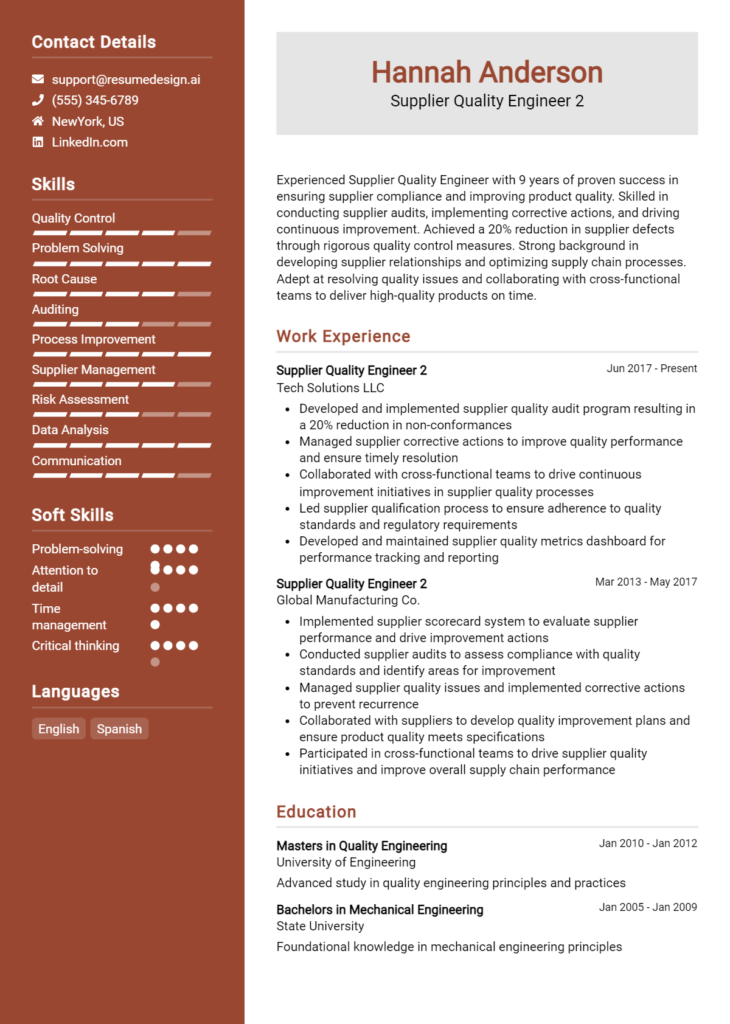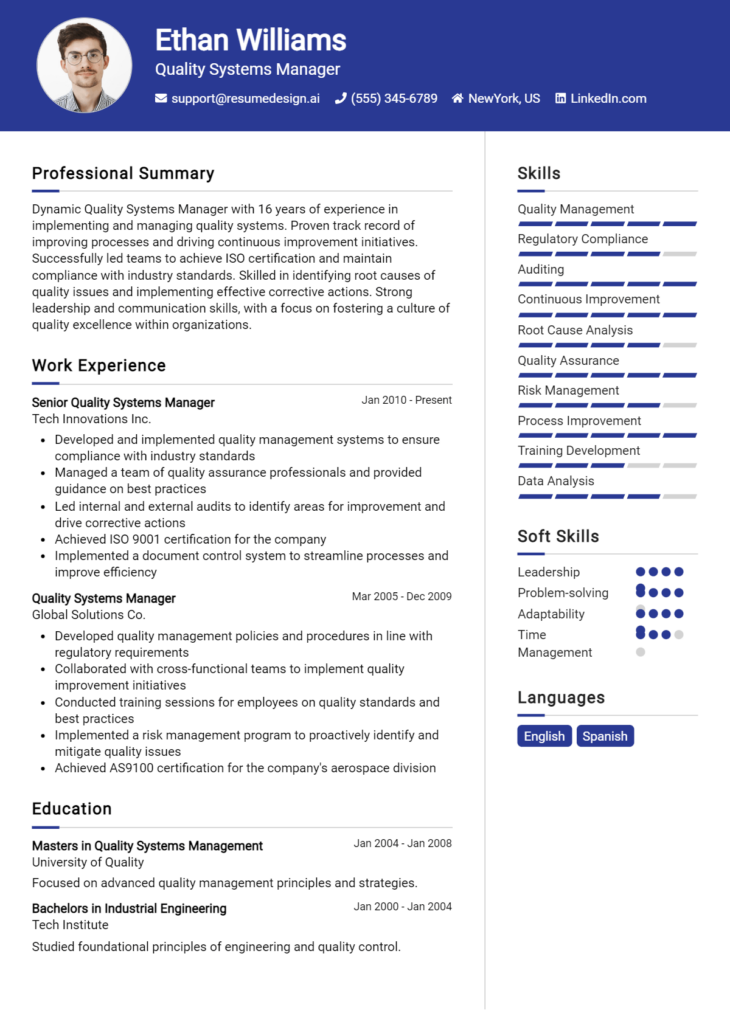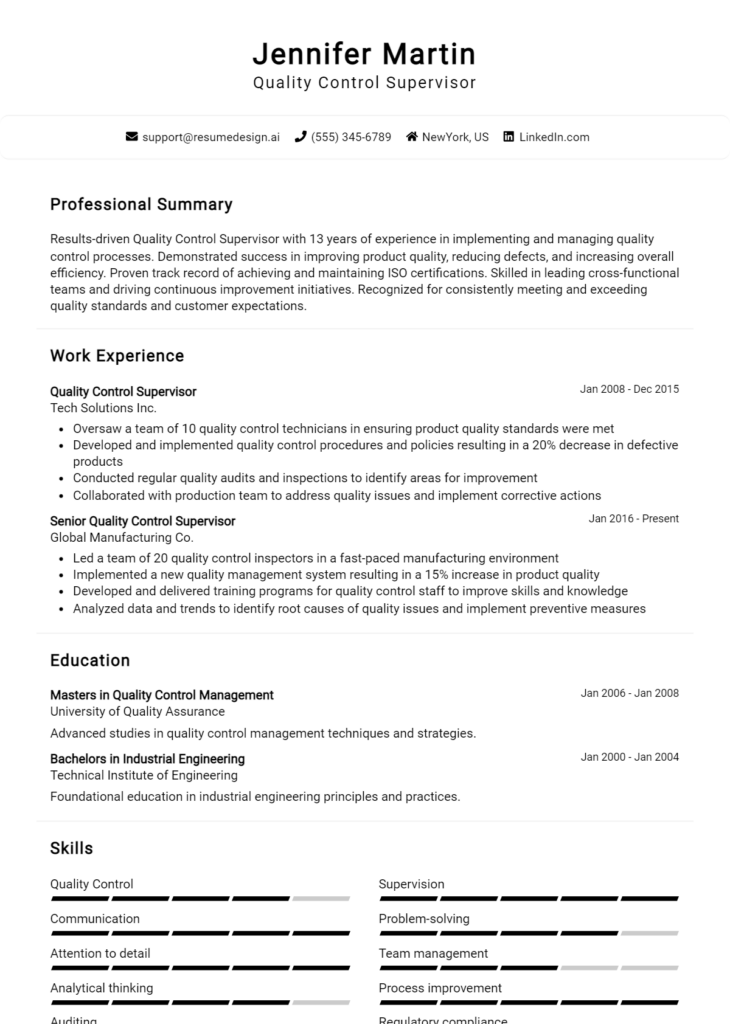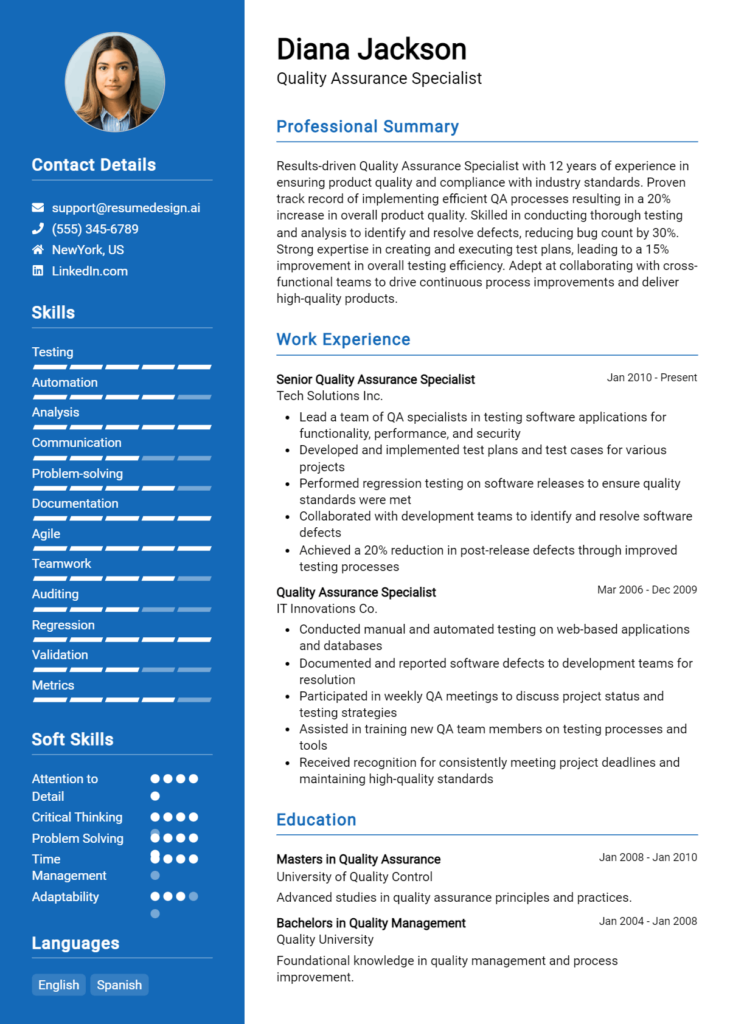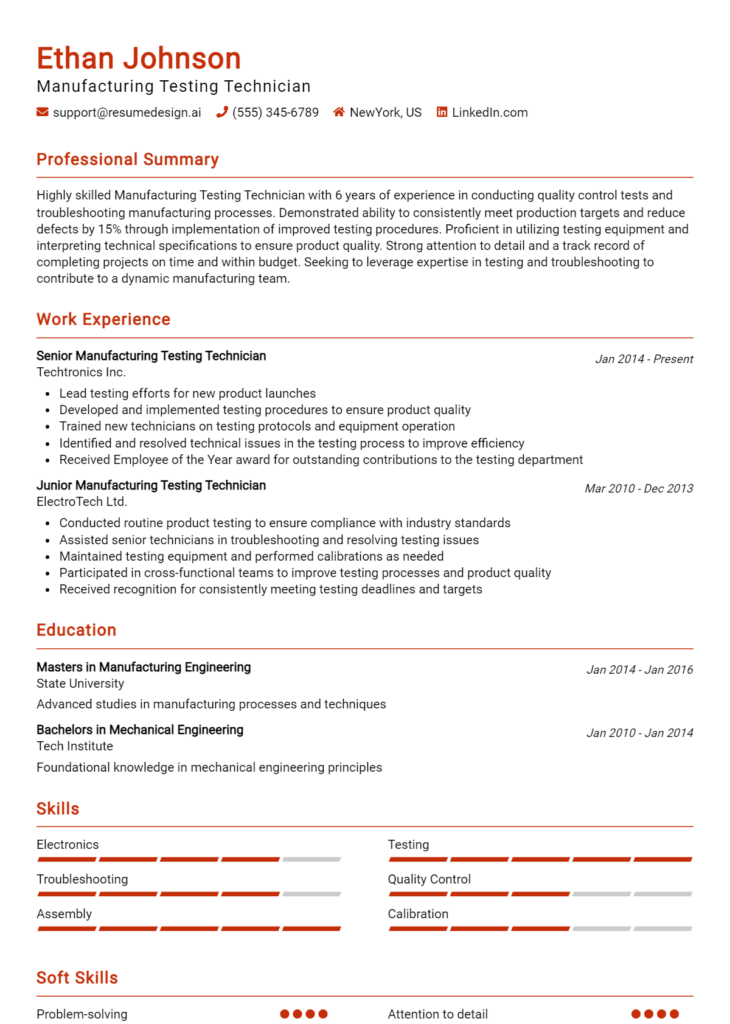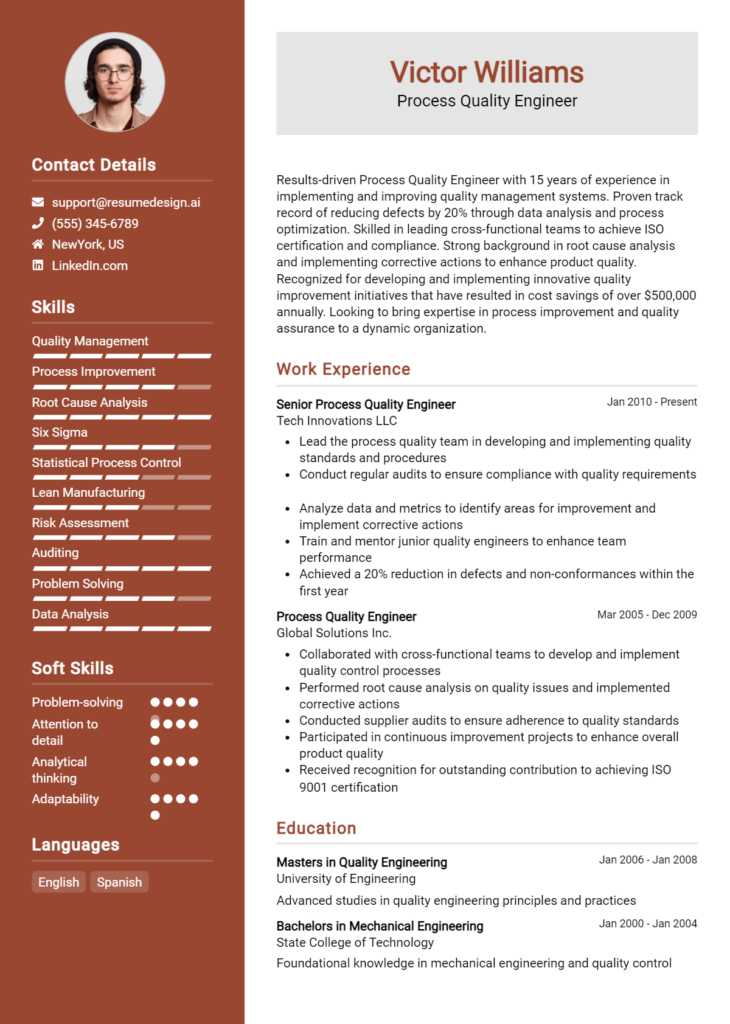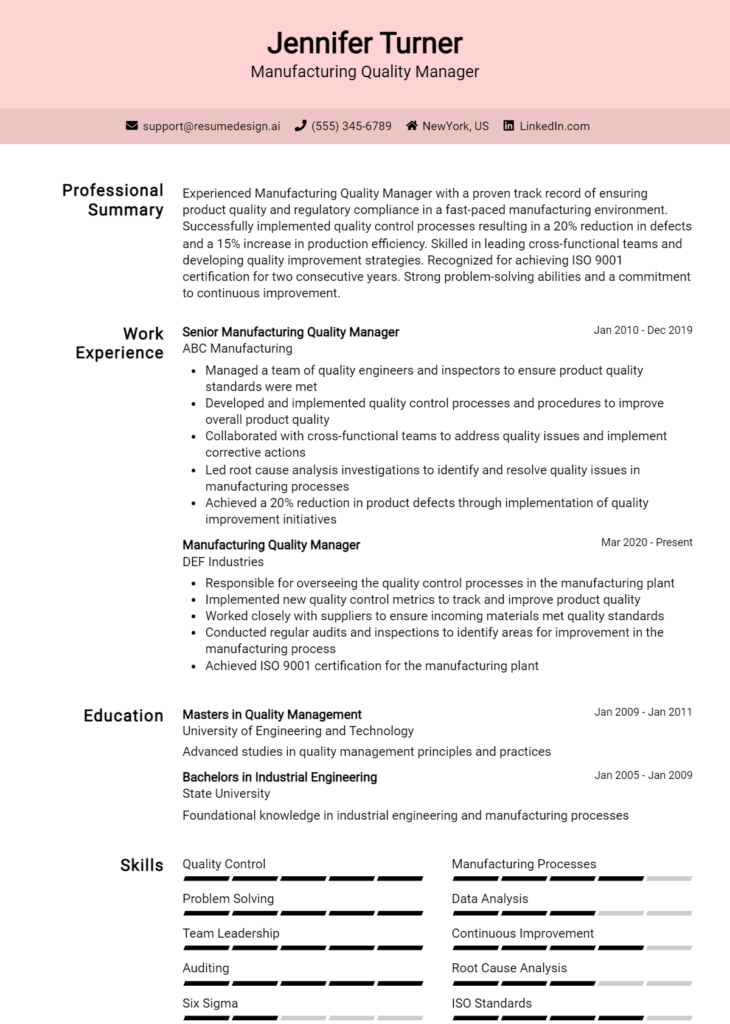Calibration Technician Core Responsibilities
A Calibration Technician plays a crucial role in ensuring precision and accuracy across various departments, linking quality assurance, production, and engineering functions. Key responsibilities include testing, adjusting, and maintaining measurement and control instruments. Successful technicians possess strong technical skills, operational knowledge, and problem-solving abilities, essential for diagnosing issues and implementing solutions. These competencies not only enhance product quality but also contribute to the organization’s overall efficiency. A well-structured resume that highlights these qualifications can effectively showcase a technician's expertise and value to potential employers.
Common Responsibilities Listed on Calibration Technician Resume
- Perform calibration of measurement and control instruments.
- Document calibration procedures and results accurately.
- Identify and troubleshoot instrument malfunctions.
- Maintain calibration equipment and tools.
- Ensure compliance with industry standards and regulations.
- Collaborate with engineering and quality assurance teams.
- Train staff on proper calibration techniques.
- Participate in continuous improvement initiatives.
- Assist in the development of calibration procedures.
- Maintain records of calibrations and equipment history.
- Monitor and report calibration trends and performance metrics.
- Support audits and compliance assessments as needed.
High-Level Resume Tips for Calibration Technician Professionals
In today's competitive job market, a well-crafted resume is crucial for Calibration Technician professionals looking to make a lasting impression on potential employers. Your resume serves as the first point of contact, reflecting not only your technical skills and qualifications but also your achievements and dedication to precision. It's essential that this document effectively showcases your abilities in calibration processes, problem-solving, and quality assurance. This guide will provide practical and actionable resume tips specifically tailored for Calibration Technician professionals, ensuring that your resume stands out among the rest.
Top Resume Tips for Calibration Technician Professionals
- Tailor your resume to the specific job description by incorporating relevant keywords and phrases.
- Highlight your relevant experience in calibration, detailing specific instruments and technologies you have worked with.
- Quantify your achievements where possible, such as the percentage of accuracy improvements or reductions in downtime you contributed to.
- Showcase your industry-specific skills, including knowledge of measurement standards and regulatory compliance.
- Include certifications and training relevant to calibration and metrology to demonstrate your commitment to professional development.
- Utilize a clean and organized format that enhances readability and allows key information to stand out.
- Incorporate action verbs to describe your responsibilities and accomplishments, making your contributions clear and impactful.
- Provide examples of problem-solving scenarios where you successfully diagnosed and resolved calibration issues.
- List any software proficiency related to calibration management systems or data analysis tools.
- Consider adding a summary statement at the top of your resume that encapsulates your skills and career goals in calibration.
By implementing these tips, Calibration Technician professionals can significantly increase their chances of landing a job in this specialized field. A targeted and well-structured resume will not only highlight your qualifications but also demonstrate your dedication to precision and excellence, making you an appealing candidate to potential employers.
Why Resume Headlines & Titles are Important for Calibration Technician
In the competitive field of calibration technology, a well-crafted resume headline or title serves as a critical first impression for candidates seeking employment. A strong headline can immediately capture the attention of hiring managers, summarizing a candidate's key qualifications in a succinct and impactful phrase. This brief statement should be concise, relevant, and directly related to the job being applied for, effectively communicating the applicant's expertise and unique skills in calibration processes and equipment. A compelling title not only highlights the candidate's strengths but also sets the tone for the rest of the resume, encouraging hiring managers to delve deeper into the applicant's qualifications.
Best Practices for Crafting Resume Headlines for Calibration Technician
- Keep it concise: Aim for one to two lines that encapsulate your qualifications.
- Be role-specific: Tailor the headline to reflect the Calibration Technician position you are applying for.
- Highlight key skills: Include essential skills or certifications relevant to the role.
- Use action-oriented language: Choose dynamic words that convey competence and expertise.
- Include measurable achievements: If possible, reference specific accomplishments that demonstrate your capabilities.
- Stay professional: Avoid casual language or overly creative phrases that may undermine your professionalism.
- Consider industry keywords: Incorporate relevant industry terminology that aligns with the job description.
- Showcase your unique value: Differentiate yourself by emphasizing what makes you stand out as a candidate.
Example Resume Headlines for Calibration Technician
Strong Resume Headlines
Certified Calibration Technician with 5+ Years of Experience in Precision Measurement
Detail-Oriented Calibration Specialist Skilled in ISO 17025 Compliance
Proficient Calibration Technician Delivering High-Quality Results with Minimal Downtime
Experienced Calibration Technician with Expertise in Electronic and Mechanical Instruments
Weak Resume Headlines
Looking for a Job
Calibration Technician
Experienced Worker
Strong headlines are effective because they quickly convey the candidate's specific qualifications and core competencies, making it easy for hiring managers to recognize their potential fit for the role. They utilize impactful language and relevant experience, which grabs attention and encourages further reading. Conversely, weak headlines fail to impress due to their generic nature and lack of specificity; they do not provide any insight into the candidate's skills or achievements, making it difficult for hiring managers to differentiate one applicant from another.
Writing an Exceptional Calibration Technician Resume Summary
A well-crafted resume summary is crucial for a Calibration Technician, as it serves as the first impression for hiring managers. This brief yet impactful introduction quickly highlights the candidate's key skills, relevant experience, and notable accomplishments, allowing them to stand out in a competitive job market. A strong summary is concise and tailored to the specific job description, ensuring that it captures the attention of decision-makers by directly addressing their needs and expectations for the role.
Best Practices for Writing a Calibration Technician Resume Summary
- Quantify achievements: Use numbers and percentages to highlight your impact, such as the number of instruments calibrated or improvements in accuracy.
- Focus on relevant skills: Include specific skills that are crucial for the role, such as knowledge of calibration standards, precision measurement techniques, or troubleshooting abilities.
- Tailor the summary: Customize your summary for each job application by integrating keywords from the job description, which demonstrates your fit for the position.
- Highlight certifications: Mention any relevant certifications or training, such as ISO or ANSI standards, that enhance your credibility as a Calibration Technician.
- Showcase accomplishments: Include notable achievements, like successful projects or process improvements, that demonstrate your expertise and contributions.
- Keep it concise: Aim for 2-4 sentences that pack a punch and convey essential information without overwhelming the reader.
- Use action verbs: Start sentences with strong action verbs to convey confidence and decisiveness in your abilities.
- Maintain professionalism: Ensure the tone is professional and aligns with the expectations of the industry.
Example Calibration Technician Resume Summaries
Strong Resume Summaries
Detail-oriented Calibration Technician with over 5 years of experience in precision measurements and instrument calibration. Increased operational efficiency by 30% through the implementation of streamlined calibration procedures, ensuring compliance with ISO 17025 standards.
Experienced Calibration Technician specializing in electronic and mechanical systems calibration. Successfully reduced calibration errors by 15% through rigorous testing and quality control measures, contributing to overall product reliability.
Skilled Calibration Technician with expertise in calibrating and maintaining measurement equipment in a fast-paced manufacturing environment. Achieved a 25% reduction in downtime by developing and executing a proactive maintenance schedule.
Weak Resume Summaries
I have experience as a Calibration Technician and can do many things related to calibration.
Hardworking individual looking for a Calibration Technician position. I am eager to help with calibration tasks.
The strong resume summaries are effective because they provide specific examples of achievements and quantify results, showcasing the candidate's skills and relevance to the Calibration Technician role. In contrast, the weak summaries lack detail, are overly vague, and fail to highlight any significant accomplishments, making them less compelling to hiring managers.
Work Experience Section for Calibration Technician Resume
The work experience section of a Calibration Technician resume is crucial as it serves as a testament to the candidate's technical skills, ability to lead teams, and commitment to delivering high-quality products. This section not only highlights the hands-on experience in calibration processes and equipment but also reflects the applicant's capacity to meet industry standards and regulations. By quantifying achievements—such as reduced downtime or increased accuracy—candidates can effectively demonstrate their contributions to previous employers. Aligning past experiences with industry benchmarks further enhances credibility and appeal to prospective employers.
Best Practices for Calibration Technician Work Experience
- Highlight specific calibration techniques and tools used in past roles.
- Quantify achievements with metrics, such as precision improvements or efficiency gains.
- Emphasize collaboration with cross-functional teams to demonstrate teamwork skills.
- Include relevant certifications or training that enhance technical expertise.
- Detail leadership experiences, such as managing calibration projects or training junior technicians.
- Showcase compliance with industry standards and regulations to highlight professionalism.
- Use action verbs to convey a sense of initiative and impact.
- Tailor experiences to align with the specific job description and requirements.
Example Work Experiences for Calibration Technician
Strong Experiences
- Led a team of 5 technicians in a project that improved calibration accuracy by 30%, resulting in a 20% reduction in production errors.
- Implemented a new calibration tracking system that decreased equipment downtime by 15%, enhancing overall productivity.
- Trained and mentored junior technicians, which increased team efficiency by 25% and improved compliance with safety protocols.
- Collaborated with engineering teams to develop new calibration procedures that met ISO 9001 standards, leading to successful certification.
Weak Experiences
- Responsible for calibrating equipment in the lab.
- Worked with a team on calibration tasks.
- Assisted in maintaining calibration records.
- Performed calibration duties as required.
The examples of strong experiences are considered effective because they quantify specific accomplishments, demonstrate leadership, and highlight collaboration, making the candidate's contributions clear and impactful. In contrast, the weak experiences lack detail and measurable outcomes, making them less compelling and failing to showcase the candidate's true capabilities and achievements in the field of calibration.
Education and Certifications Section for Calibration Technician Resume
The education and certifications section of a Calibration Technician resume is crucial for showcasing a candidate's academic background and the specialized knowledge necessary for the role. This section not only highlights relevant degrees and industry-standard certifications but also reflects the candidate's commitment to continuous learning and professional development. By providing details on relevant coursework, certifications, and any specialized training, candidates can significantly enhance their credibility and demonstrate alignment with the specific requirements of the job, making them more attractive to potential employers.
Best Practices for Calibration Technician Education and Certifications
- Include degrees from accredited institutions relevant to calibration technology, engineering, or a related field.
- List industry-recognized certifications, such as those from the National Institute of Standards and Technology (NIST) or the International Society of Automation (ISA).
- Provide details on relevant coursework that directly pertains to calibration procedures and techniques.
- Highlight any specialized training or workshops attended that enhance practical skills in calibration and measurement.
- Use clear and concise language to describe certifications, including the date achieved and any renewal information.
- Prioritize the most relevant educational experiences at the top of the section to draw immediate attention.
- Consider including ongoing education efforts, such as online courses or webinars, that demonstrate a commitment to staying current in the field.
- Ensure that all information is up-to-date and accurately reflects the candidate's qualifications.
Example Education and Certifications for Calibration Technician
Strong Examples
- Bachelor of Science in Electrical Engineering, ABC University, Graduated May 2020
- Certified Calibration Technician (CCT), National Institute of Standards and Technology (NIST), Certified in 2022
- Advanced Calibration Techniques Course, XYZ Technical Institute, Completed December 2021
- Associate Degree in Applied Science - Instrumentation Technology, DEF Community College, Graduated June 2018
Weak Examples
- High School Diploma, GHI High School, Graduated 2015
- Certification in General Office Skills, JKL Training Center, Obtained 2019
- Basic Math Course, MNO Adult Education Program, Completed 2017
- Certification in Microsoft Office, PQR Institute, Achieved 2020
The strong examples are considered effective because they directly align with the skills and knowledge required for a Calibration Technician role, showcasing relevant education and certifications that demonstrate expertise in the field. In contrast, the weak examples lack relevance to calibration and measurement, emphasizing outdated or unrelated qualifications that do not enhance the candidate's suitability for the position.
Top Skills & Keywords for Calibration Technician Resume
As a Calibration Technician, possessing the right skills is crucial for success in this role. A well-crafted resume that highlights both hard and soft skills can significantly enhance a candidate's chances of standing out in a competitive job market. Calibration Technicians are responsible for ensuring that instruments and equipment operate accurately and efficiently, which requires a blend of technical expertise, problem-solving abilities, and effective communication skills. By showcasing these competencies, applicants can demonstrate their capability to maintain quality standards and contribute to the overall success of their organization. For more insights on essential skills and how to present your work experience, continue reading.
Top Hard & Soft Skills for Calibration Technician
Soft Skills
- Attention to Detail
- Problem-Solving
- Analytical Thinking
- Communication Skills
- Time Management
- Team Collaboration
- Adaptability
- Critical Thinking
- Organizational Skills
- Customer Service Orientation
Hard Skills
- Knowledge of Calibration Standards (ISO, ANSI, etc.)
- Proficiency in Calibration Software
- Understanding of Measurement Instruments
- Data Analysis and Interpretation
- Technical Documentation Skills
- Electrical and Mechanical Troubleshooting
- Familiarity with Quality Assurance Processes
- Experience with Metrology
- Computer Literacy (Excel, CAD software)
- Safety and Compliance Knowledge
Stand Out with a Winning Calibration Technician Cover Letter
Dear [Hiring Manager's Name],
I am writing to express my interest in the Calibration Technician position at [Company Name] as advertised on [Job Board/Company Website]. With a strong background in precision measurement and instrumentation, coupled with my commitment to maintaining high standards of quality and accuracy, I am excited about the opportunity to contribute to your team. My hands-on experience in calibrating a wide range of instruments and equipment has equipped me with the technical skills and attention to detail necessary to excel in this role.
In my previous position at [Previous Company Name], I was responsible for the calibration and maintenance of various measuring devices, including pressure gauges, thermometers, and multimeters. I consistently adhered to industry standards and best practices, which resulted in a significant reduction in measurement discrepancies and improved overall equipment reliability. I pride myself on my ability to troubleshoot complex problems and implement effective solutions, ensuring that all equipment meets the stringent requirements set forth by regulatory agencies.
I am particularly drawn to [Company Name] because of its commitment to innovation and quality. I admire your dedication to advancing technology and your focus on continuous improvement. I am eager to bring my expertise in calibration processes and my proactive approach to problem-solving to your organization. I am confident that my skills and enthusiasm align well with your team’s goals, and I look forward to the opportunity to contribute to your continued success.
Thank you for considering my application. I would be thrilled to discuss how my background, skills, and certifications can be an asset to [Company Name]. I am looking forward to the opportunity for an interview to further discuss how I can support your team in achieving its objectives.
Sincerely,
[Your Name]
[Your Phone Number]
[Your Email Address]
Common Mistakes to Avoid in a Calibration Technician Resume
When crafting a resume for a Calibration Technician position, it’s essential to highlight relevant skills and experiences that align with the demands of the role. However, many applicants make critical mistakes that can hinder their chances of landing an interview. Avoiding these common pitfalls can help ensure that your resume stands out for the right reasons.
Lack of Specificity: Generalizing skills or experiences without providing specific examples can make your resume forgettable. Instead, detail your proficiency with particular calibration tools or techniques.
Ignoring Keywords: Many employers use applicant tracking systems to filter resumes. Failing to incorporate industry-specific keywords can result in your resume being overlooked.
Overloading with Technical Jargon: While it’s important to demonstrate technical knowledge, using too much jargon can alienate hiring managers who may not be familiar with all the terms. Aim for a balance that conveys expertise without overwhelming the reader.
Neglecting Certifications: Calibration technicians often require specific certifications. Failing to list relevant certifications prominently can make your resume appear incomplete or less qualified.
Poor Formatting: A cluttered or poorly organized resume can make it difficult for hiring managers to find key information. Use clean, professional formatting with clear headings and bullet points for easy readability.
Not Tailoring the Resume: Sending out a generic resume can be detrimental. Tailor your resume for each job application, aligning your skills and experiences with the specific requirements of the position.
Omitting Soft Skills: While technical skills are crucial, soft skills such as attention to detail, problem-solving abilities, and teamwork are equally important. Failing to highlight these can give an incomplete picture of your capabilities.
Inaccurate Job Descriptions: Misrepresenting your past job roles or responsibilities can be a red flag for employers. Always ensure that your descriptions accurately reflect your actual duties and achievements.
Conclusion
As a Calibration Technician, your role is pivotal in ensuring the accuracy and reliability of measurement instruments. Throughout this article, we highlighted the essential skills required for this position, such as attention to detail, analytical thinking, and proficiency with various calibration standards and techniques. We also discussed the importance of maintaining compliance with industry regulations and the value of continuous professional development in keeping your skills relevant.
In conclusion, it’s crucial to present your qualifications effectively when applying for positions in this field. A well-crafted resume can significantly enhance your chances of landing an interview. We encourage you to take the time to review and refine your Calibration Technician resume to reflect your skills and experiences accurately.
To assist you in this process, we recommend exploring the following resources:
- Resume Templates to find a layout that suits your style.
- Resume Builder for an easy and guided approach to creating your resume.
- Resume Examples to gain inspiration from successful Calibration Technician resumes.
- Cover Letter Templates to complement your resume with a professional cover letter.
Don’t wait—revamp your resume today and take the next step towards your career advancement!

